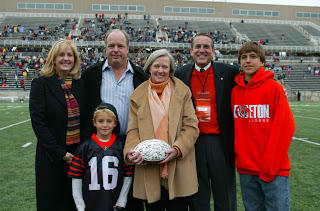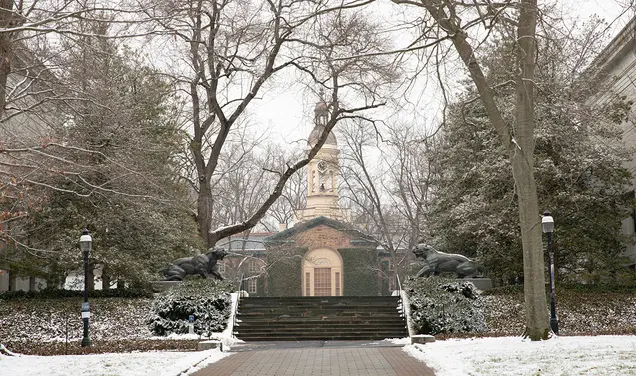The Weekly Blog: 12/6/10
Streep’s latest role: Belknap Visitor
Oscar- and Emmy Award-winning actress Meryl Streep spoke to a packed McCosh lecture hall Nov. 30 as this year’s Belknap Visitor in the Humanities. “My achievement is that I’ve pretended to be extraordinary people all my life and now I’m being treated like one,” she said in the introduction to her talk. Streep emphasized the importance of empathy, which connects her to the characters she plays and is, she said, what “civilizes us” and “the one thing that can stop us from killing each other.” When it came to revealing how she practices her craft, Streep demurred. “I have a deliberate reluctance to analyze what I do,” she said. “I’ll make myself self-conscious and being self-conscious is death to an actor.”
Powers’ gridiron gift
Bill Powers ’79, standing second from left, and members of his family were recognized by the University during the Dartmouth game for Powers’ $10 million gift to Princeton’s football program, the largest donation ever to Princeton athletics. Powers, a managing director of the California-based Pacific Investment Management Co. and a former All-Ivy punter, also gave $500,000 to establish two scholarships. The University is naming Princeton Stadium’s artificial-turf field Powers Field in the family’s honor. From left in the photo are Powers’ wife Carolyn, Powers, their son Will, President Tilghman, Director of Athletics Gary Walters ’67, and Powers’ stepson, Tommy Cleator.
Photo by Beverly Schaefer
Annan addresses the nuclear threat
Outgoing U.N. Secretary-General Kofi Annan delivered one of his four farewell policy addresses at Richardson Auditorium Nov. 28, speaking at length on the threat of nuclear weapons and the lack of progress in non-proliferation and disarmament efforts. Without movement on either front, “mutually assured destruction has been replaced by mutually assured paralysis,” Annan said. The secretary-general urged nations to support both non-proliferation and disarmament. “We need a renewed debate,” he said, “a renewed debate which must be inclusive, must respect the norms of international negotiations, and must reaffirm the multilateral approach – Woodrow Wilson [1879]’s approach – firmly grounded in international institutions, treaties, rules, and norms of appropriate behavior.”
Basketball’s long road home
After playing its first seven games on the road, Princeton men’s basketball opens its Jadwin Gym schedule Dec. 6 against Lehigh at 7:30 p.m. The Tigers also will host Rutgers Dec. 9 at 2 p.m. and Marshall Dec. 16 at 2 p.m. Princeton has played Rutgers 112 times, more than any other non-Ivy opponent, but after the Scarlet Knights’ 54-44 win in Piscataway last season, then-coach Gary Waters said that since Rutgers’ Big East opponents do not use Princeton’s style of play, his team had little to gain from the matchup. In a preseason interview with PAW freelance contributor Jay Greenberg, Princeton head coach Joe Scott ’87 said, “Rutgers may feel that way about us, but guess what, you had better beat us.” The Tigers have won 13 of their last 24 meetings with Rutgers and lead the all-time series by a wide margin (72-40).
War, in the words of the troops
Andrew Carroll, editor of Operation Homecoming (Random House), a recent book of journal entries, short stories, letters, and poems by U.S. troops who served in Iraq and Afghanistan, spoke about his experiences collecting wartime correspondence with students and community members at Robertson Hall Dec. 5. Among the stories in Operation Homecoming are two fictional accounts by Woodrow Wilson School graduate student Ross Cohen, who participated in the discussion with Carroll.
The National Endowment for the Arts spearheaded the Operation Homecoming project, funding seminars in which leading writers such as Bobbie Ann Mason and Tom Clancy worked with soldiers to help them bring their stories to print. Carroll, who heads the non-profit Legacy Project, said he initially wondered whether soldiers would be willing to write openly so soon after their combat experiences. But their work proved remarkable, with vivid descriptions not just of what they saw but what they felt. The stories, and war letters in general, are a rich source of history, according to Carroll. “They don’t move men across continents the way that generals’ orders do,” he said, “but in many ways, I think they’re every bit as important historically.”













No responses yet